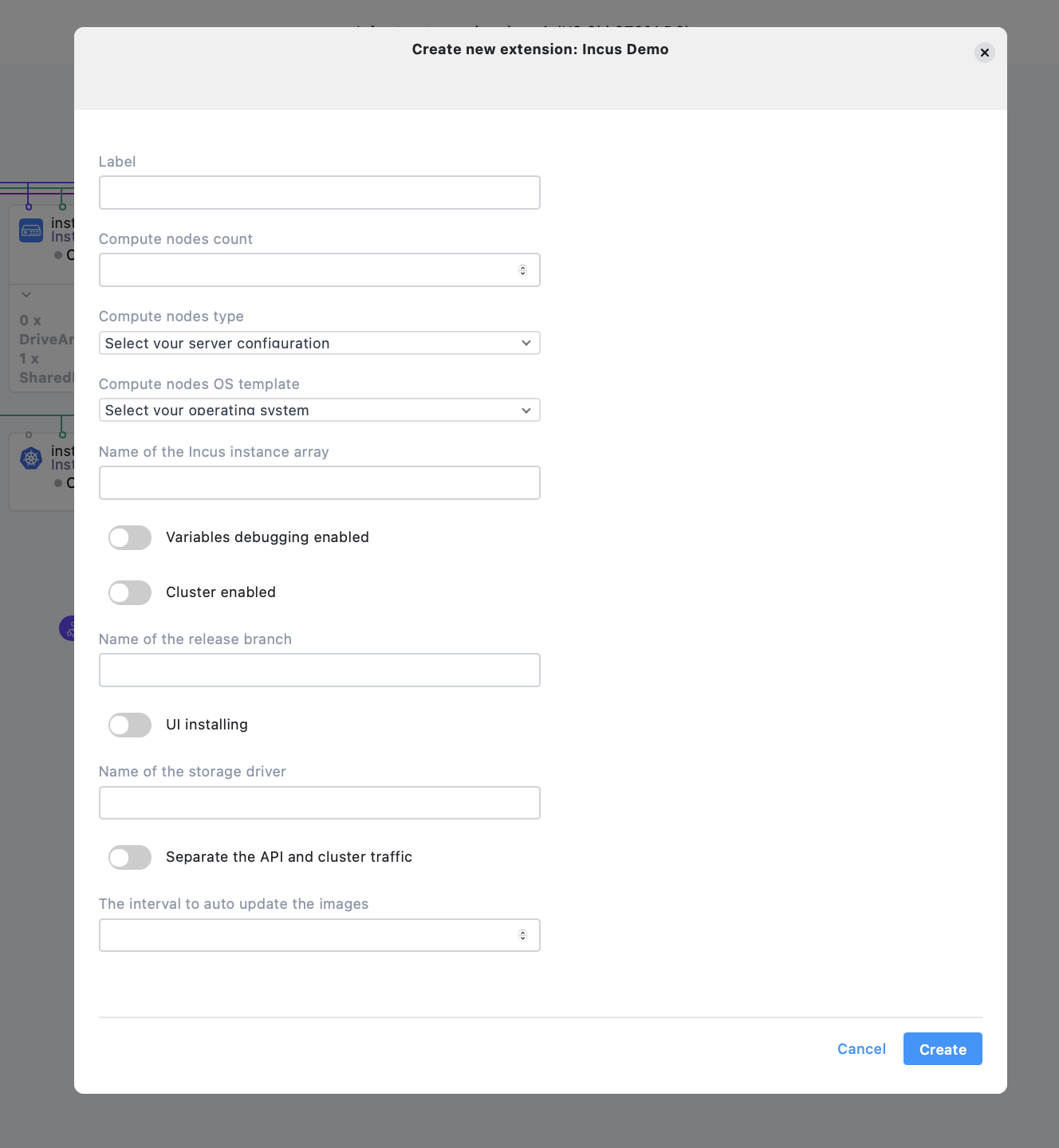MetalSoft Extensions¶
Available since 6.4
Extensions are a mechanism to extend the functionality of MetalSoft beyond what is provided out-of-the-box.
Currently there is only a single type of extension, the ‘app’ extension that adds a custom button in the Infrastructure Editor.
Creation Lifecycle:
The user clicks the button and a custom form is shown with inputs defined in the yaml file in the
inputsfield:

The instance arrays are created according to the yaml specification
Upon Deploy the resources are deployed and the
oncreateentrypoint is executed
Update lifecycle
The user clicks the infrastructure elements and a form is opened allowing the user to change any of the input params.
Upon deploy additional resources are deployed as needed and the
oneditentrypoint is executed
Delete lifecycle
The user clicks the delete button in the infrastrucure editor form associated with the button
Upon deploy the
ondeleteentrypoint is executed and then all resources are released
id: 1
name: Incus Demo
label: incus-demo-1
description: Extension description
status: draft
definition:
kind: ExtensionDefinition
schemaVersion: "1.1"
name: Incus Platform
label: incus
extensionType: incus-app
vendor: MetalSoft
extensionVersion: "1.0"
description: Enables the automatic deployment of private and shared incus clusters. Latest supported version is 6.4.
icon: none
dependencies:
controllerVersion: 6.4+
osTemplates:
- ubuntu-24-04
inputs:
- label: compute_nodes
name: Compute nodes count
inputType: ExtensionInputInteger
options:
minValue: 1
maxValue: 100
deniedValues:
- 2
- 4
- label: compute_nodes_type
name: Compute nodes type
inputType: ExtensionInputServerType
options: {}
- label: instance_array_name
name: Name of the Incus instance array
inputType: ExtensionInputString
options: {}
- label: compute_nodes_os_template
name: Compute nodes OS template
inputType: ExtensionInputOsTemplate
options:
osFamily: Linux
- label: vars_debugging_enabled
name: Variables debugging enabled
inputType: ExtensionInputBoolean
options: {}
- label: cluster_enabled
name: Cluster enabled
inputType: ExtensionInputBoolean
options: {}
- label: branch_release
name: Name of the release branch
inputType: ExtensionInputString
options: {}
- label: ui_installing
name: UI installing
inputType: ExtensionInputBoolean
options: {}
- label: storage_driver
name: Name of the storage driver
inputType: ExtensionInputString
options: {}
- label: separate_api_and_cluster_traffic
name: Separate the API and cluster traffic
inputType: ExtensionInputBoolean
options: {}
- label: images_auto_update_interval
name: The interval to auto update the images
inputType: ExtensionInputInteger
options: {}
outputs: []
infrastructure:
instanceArrays:
- label: '#/input/instance_array_name'
instanceCount: '#/input/compute_nodes'
serverType: '#/input/compute_nodes_type'
osTemplate: '#/input/compute_nodes_os_template'
customVariables:
- name: vars_debugging_enabled
value: '#/input/vars_debugging_enabled'
- name: cluster_enabled
value: '#/input/cluster_enabled'
- name: branch_release
value: '#/input/branch_release'
- name: ui_installing
value: '#/input/ui_installing'
- name: storage_driver
value: '#/input/storage_driver'
- name: separate_api_and_cluster_traffic
value: '#/input/separate_api_and_cluster_traffic'
- name: images_auto_update_interval
value: '#/input/images_auto_update_interval'
assets:
- label: my_ansible_bundle_1
name: The Incus Ansible bundle
assetType: AnsibleBundle
url: https://repo.metalsoft.io/.extensions_ms/incus-v1alpha1.zip
onCreate:
postDeploy:
- label: createStep
taskType: ExtensionTaskAnsible
options:
asset: my_ansible_bundle_1
playbook: deploy.yaml
onEdit:
postDeploy:
- label: scaleStep
taskType: ExtensionTaskAnsible
options:
asset: my_ansible_bundle_1
playbook: scale.yaml
- label: updateStep
taskType: ExtensionTaskAnsible
options:
asset: my_ansible_bundle_1
playbook: upgrade.yaml
To manage the extensions a series of CLI commands are provided:
extension list - Lists all extensions.
extension get - Get extension.
extension create - Create extension.
extension edit - Update extension.
extension archive - Archive extension.
extension publish - Publish extension.
It is not possible to delete an extension, only to archive it. Publishing an extension will allow users other than the owner to deploy it.
Additionally a series of commands are provided to manipulate extension instances which are instances of the extension, deployed by users.